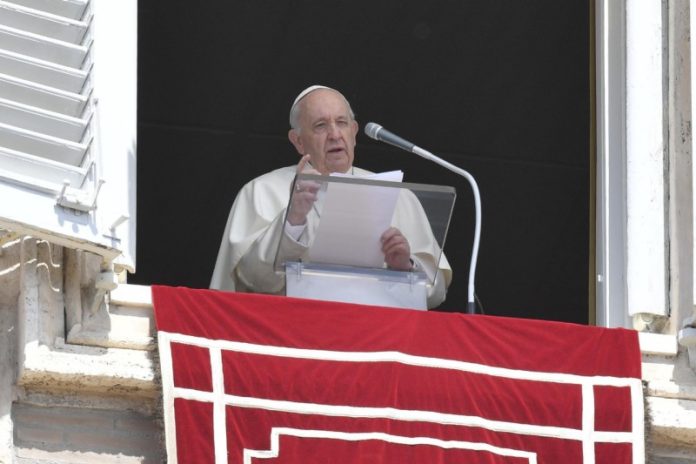Fear is like a tomb that can “bury us,” Pope Francis said Monday, but the Risen Lord’s words to the women who were the first to announce his resurrection apply to us, as well: “Be not afraid.”
Jesus knows that “our fears are our daily enemies” and that “our fears hide from the great fear, that of death: fear of fading away, or losing loved ones, of being sick, of not being able to cope further,” the pope said.
But Easter marks the day that Jesus conquered death, he added, “so no one else can tell us in a more convincing way: ‘Do not be afraid.’”
Pope Francis spoke Monday afternoon to a large crowd in St. Peter’s Square on La Pasquetta, or “Little Easter,” a national holiday in Italy. The day’s Gospel reading, from the twenty-eighth chapter of Matthew, records how Mary Magdalene and “the other Mary” encounter Jesus while running to bring the news of his rising to his disciples.
“Brother, sister, who believe in Christ, do not be afraid! Jesus says: ‘I tasted death for you, I took your pain upon myself. Now I have risen to tell you: I am here with you forever. Do not be afraid!’” Pope Francis said.
The Holy Father noted that the Lord gives the women another instruction: “Go and tell my brethren to go to Galilee, and there they will see me.”
Fear “closes us in on ourselves,” the pope said, but we can overcome fear by answering Jesus’ call to proclaim the resurrection to others.
We may doubt our ability to share that news, but it is important to note that “the women were not perhaps the most suitable and prepared to proclaim the resurrection” either, the pope said. Nevertheless, “that did not matter to the Lord.”
Jesus cares only that “we go forth and proclaim … because the Easter joy is not to be kept to oneself,” he said.

“The joy of Christ is strengthened by giving it, it multiplies sharing it,” Pope Francis added. “If we open ourselves and bear the Gospel, our hearts will open and overcome fear. This is the secret: We proclaim and overcome fear.”
In addition to fear, there is another obstacle to sharing the Gospel, the pope noted: falsehood.
Falsehood can be seen in the “counter-proclamation” of the soldiers who guarded the tomb and lied saying that Jesus’s body was stolen by his disciples, the pope said.
“The Gospel says [the guards] were paid ‘a sum of money,’ a good sum, and received these instructions: ‘Tell people, “His disciples came by night and stole him away while we were asleep”’’” Pope Francis said.
But there is a contradiction: If the soldiers were sleeping, how did they see the disciples steal Jesus’ body? The payment they received explains their contrived narrative. Money is “the other lord that Jesus says we must never serve,” the pope said.
“Before the Risen Lord, there is another ‘god’ – the god of money that dirties and ruins everything, that closes the door to salvation,” Pope Francis said. “This is present everywhere in daily life with the temptation to adore the god of money.”
Pope Francis said that when deceit and lies are discovered by the media within the lives of people, it causes scandal.
“But let us give a name also to the obscurity and falsehoods we have in ourselves! And let us place our own darkness and falsehoods before the light of the Risen Jesus,” he said.
Jesus wants to “bring hidden things to light to make us transparent and luminous witnesses to the joy of the Gospel, of the truth that will make you free,” he said.
He then asked “Mary, Mother of the Risen One,” to “help us overcome our fears and give us passion for the truth.”









